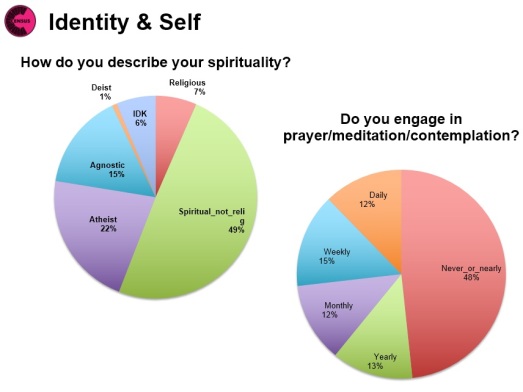In this and the next blog post, we examine the spirituality and religiosity of the 2013 Burning Man population.
First, we see that almost half of all Burners identify as “spiritual but not religious.” This may indicate that the major religious options of today fail to capture a desire for a spiritual facet in our lives, leaving many of us to reject a “religious” identity while maintaining a sense of spirituality in our lives. Next, more than a third of Burners identify as athiest (22%) or agnostic (15%). This is considerably higher than the background US population, but might not be that surprising considering that those who identify as athiest or agnostic also tend to be younger and more male than average, as the BRC population also tends to be. Finally, we are left with only 7% who claim to be religious, 6% who “don’t know” (which some might consider the definition of agnostic), and 1% Deist.
In the future, perhaps we could offer “select all that apply” for this question. For myself, I would probably check both the “spiritual not religious” and “agnostic” categories. We couldn’t make such nice pie graphs, but we might better capture how people identify with spirituality.
We then asked “Do you engage in prayer/meditation/contemplation” in an attempt to measure spiritual behavior in addition to spiritual description/identity. We see that almost half of Burners do not engage in these behaviors on a regular basis. Among the other half, it’s a fairly even split among frequencies: 15% practice daily, 15% practice weekly, 12% practice monthly, and 13% practice yearly.
I wonder if Burning Man is the place of practice for some of those 13% who practice yearly, making their annual pilgrimage to the desert. I also wonder about the word “contemplation.” In the context of “prayer” and “meditation” I think it’s clear enough that it’s referring to a sort of spiritual contemplation, but I also wonder if any of us go a single day without contemplating something in a more conventional sense of the word (e.g. contemplating a sunset, the bug that landed on my arm, or my relationship to the earth). I also wonder if we asked “How often do you engage in contemplation?” whether the reported rates would be higher.
See our next post on religion for more analysis of these topics and comparisons with the rest of the USA.
Written by Steven “Indiana” Crane, edited by Eulophia


Pingback: Burning Blog » Blog Archive » Burning Book Club – preface – “Atheism isn’t as easy as it looks”